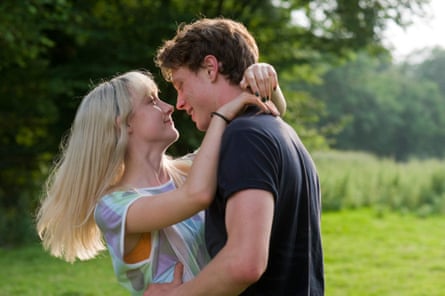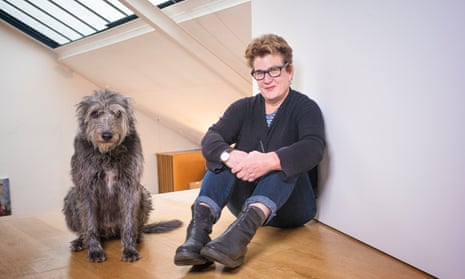After producing seven high-end Young Adult novels in 12 years, Meg Rosoff has published her first book for adults – a sweet romcom about a hapless twentysomething New Yorker and his two rather smarter dogs. When I tell her that Jonathan Unleashed took me by surprise, she is momentarily exasperated, protesting, “Why does everyone say they’re surprised?” But after thinking for a minute, she concedes with a theatrical shrug, “Doesn’t everybody react with surprise every time I write a book?”
It was a very different type of book with which Rosoff made her debut in 2004. How I Live Now was a tale of adolescents abandoned in the English countryside as an incomprehensible war rages around them. Described by Mark Haddon as “that rare, rare thing, a first novel with a sustained, magical and utterly faultless voice,” it won a fistful of prizes and secured Rosoff a place in the front rank of crossover novelists who were sweeping up both child and adult readers. It went on to sell nearly 1m copies and last year was made into a film under the direction of Kevin Macdonald, with Saoirse Ronan as the protagonist, Daisy.
How I Live Now established a Rosoff marque of thoughtful, borderline subversive stories with more style than plot, though not all her novels have been so serious: Vamoose (2010) was a black comedy involving a couple who have a moose instead of a baby; There Is No Dog (2011) posed the scenario of the whole of creation being placed in the hands of a petulant and hormonal teenage boy.
All her novels feature animals, and Dante and Sissy in Jonathan Unleashed are the latest in a long line of canines, both physical and metaphorical, that romp through her work, making their first appearance in a description of Daisy’s cousin Edmond at the start of How I Live Now: “He’s exactly like some kind of mutt, you know the ones you see at the dog shelter who are kind of hopeful and sweet and put their nose straight into your hand when they meet you with a certain kind of dignity and you know from that second that you’re going to take him home.”
Dante and Sissy, a sheepdog and a spaniel abandoned to Jonathan after his brother lands a job in Dubai, provide both a plot engine that drags their guardian through the wilderness of the wrong job and wrong relationship, and a beady eye that gives the resulting comedy its perspective. With its compact sidewalk setting and kooky New York humour, it’s no surprise to learn that the novel was written with more than half an eye on the film possibilities.

In the Manhattan-style loft she shares with her husband and two lurchers in an ultra-urban corner of south London, Rosoff explains that the idea came out of a conversation with a friend, Michael Kuhn, one of the producers behind Four Weddings and a Funeral. “I’ve always asked him, ‘What is your ideal?’ And he said he’d love a romcom with a twist. So I said, ‘OK I’m going to write one.’” Undaunted by his reaction, which was to laugh, she began to write, sending scenes as she went. He seemed uninterested and at first, she admits, there were problems. “Jonathan wasn’t strong enough: when you have a very weedy, odd character you have to be careful that he doesn’t come across as whiny.”
Her old publisher, Penguin, also showed no interest, “and I thought it was going to be the usual sweet book that nobody reads”. But she kept faith with the story, and one final revision proved her dramatically right: “There was an explosion. Publishers and film companies were phoning up for it.”
In terms of publisher and market it is a new departure for Rosoff, who felt that her stock was drifting down with Penguin, from the dizzy heights of her early novels. “I was getting quite fed up because I was on my fifth or sixth editor. It felt as if they had completely lost interest. The wheel was turning towards big volume, big sales, whereas I’ve been writing quiet, fairly small-market books.”
Yet in the ordinariness of its setting and its animal-centricity, Jonathan Unleashed reflects preoccupations that go back to her own childhood as one of four daughters born into “a nice Jewish family” in suburban Boston. Her father was a doctor and she was the good daughter who did well at school and was animal mad. She took up horse-riding, suffering the first of several concussions, and helped out with the snakes at Boston science museum, “cleaning the cages and hacking frozen cubes of baby birds apart to feed them”.
“It was all incredibly ordinary, and I thought that was the kiss of death to ever being a writer,” she says, with the characteristic Rosoff afterthought that it would be years before she discovered that “the best teacher I ever had in the best school I went to in the best year of my life had been jailed for paedophilia: so there were stories in the boring suburbs.”
It was only after at she made it to Harvard that her life began to veer off the beaten track. Finding it “just too conventional”, she dropped out for a year, flew to London and signed up for a course in sculpture at St Martin’s School of Art. Though she realised instantly that she wasn’t cut out to be an artist, the experience changed her: she fell in love with England and went fashionably wild. “The dollar was strong, I had my hair cut at Vidal Sassoon, bought clothes from Camden market and came back to New York cool.” She finished her degree but maintained her street cred by playing bass in a band. Like sculpture and riding, it was a hobby that was destined not to yield a vocation. “I’ve spent my life being not very good at things but doing them with a mad passion.”

Like Jonathan, she stumbled through her 20s in New York – “I had no boyfriends and couldn’t find a career or a place for myself in the world.” So she returned to London, fell in love with an artist, Paul Hamlyn, who is now her husband, and – like Jonathan – went to work in advertising, where she remained for 15 years, despite being sacked numerous times. “It was sexist, idiotic and now I’m proud of myself for getting fired so often, but at the time it was just demoralising,” she says. “It never occurred to me that having a decent intellect was a problem for being good at advertising because they are always trying to tell you what to do.”
One result was that, despite a successful marriage and the birth of a much-loved daughter, she had “all this hate: it just felt like an adolescence that went on until my 40s”. The event she credits with snapping her into adulthood, and a writing career, was the death of her youngest sister from breast cancer, which impressed on her that time was too precious to waste. She wrote How I Live Now in the gaps between working and caring for her daughter, and on the day the manuscript was sold, she resigned.
By the time it was published, Rosoff was 47 years old and had herself been diagnosed with breast cancer. She arrived with her small daughter, Gloria, to collect the first of many awards, the Guardian children’s fiction prize, blanched by chemotherapy and frantically fending off well-wishers for fear that they would pass on an infection. “It was the dark and the light so intensely felt that impressed me,” recalls the chair of judges, Julia Eccleshare. “I remember going to interview her and we started talking really seriously about life, death and what being a good person meant. All her books have this incredibly fierce interiority that propels them.”
How I Live Now channelled Rosoff’s self-professed bolshiness into the story of a scratchy, anorexic 15-year-old American who is sent to stay with her dead mother’s family in the English countryside. It wasn’t targeted at the YA market, and some of its elements were openly transgressive – not least the romance between Daisy and her 14-year-old cousin, Edmond. After the success came the backlash. Isn’t it interesting, she says now, that people were so troubled by the sexual relationship between cousins [which is legal in the UK], when nobody seemed to care that Daisy and Edmond were just 15 and 14 years old, or that part of Edmond’s allure was that he was a chain smoker who always smelled of tobacco.
The uncertainties of teenage sexuality, and the magnetism of outsiders are abiding themes, resurfacing in novels such as What I Was (2007), in which a disaffected public schoolboy becomes besotted with an androgynous loner who lives in a hut on the seashore. “It’s the story of teenagers struggling not only with sexuality but with gender identity, and, in terms of children’s books, was ahead of its time,” says Eccleshare.
Nicholas Tucker, an academic and broadcaster specialising in children’s books, believes the cancer diagnosis not only prompted Rosoff to become a writer but has shaped what she has written, creating “a series of uncompromising novels”.
“She took on politics, atheism, bullying, but also horse-riding and animals in general. It could also explain why she sometimes goes in for rather rushed, happy endings that can contrast quite strongly with what has gone before. Because after all, she has to date had a happy non-ending herself.”
Tucker’s sense that she “does what she fancies, with no long-term strategy” is echoed by Rosoff, who describes herself as “naturally lateral” and says, “I don’t ever think about my audience.” She fiercely resists any sense of literary obligation and believes that “the children’s world is getting far too literal about what needs to be represented. I really hate the idea that we need agendas in books.”
When she wrote as much on social media last year – questioning a US Kickstarter project to fund a book about “a queer black five-year-old” – she unleashed a Twitter storm that generated 30,000 hate tweets. “I was utterly stunned by the level of vitriol. No one was interested in a more subtle argument.” It took her 24 hours to shrug it off as the narrow-mindedness of people who “weren’t readers, or not MY readers”.
She might have mellowed and lost the hatred – “it took 12 years to compost down into the comedy of Jonathan Unleashed” – but she remains brave and bolshy, impossible to predict or to pigeonhole. “I think maybe I’ve said mostly what I have to say about adolescence,” she muses. “But more comedies for adults? Probably not.
“On the other hand, I’ve noticed that those who have the most in common are teenagers and people in their 50s who are getting divorced and asking the same basic questions: Will anyone love me? What am I going to be?” Wherever her muse takes her next, it’s probably safe to say that there will be dogs.

Comments (…)
Sign in or create your Guardian account to join the discussion